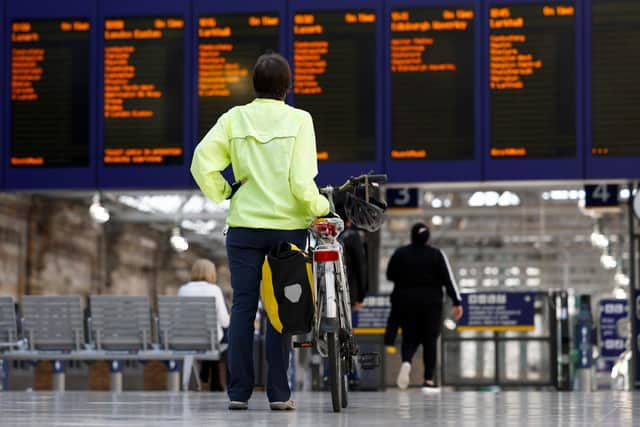Train strikes this week: when are rail staff on strike July 2022, when is the next one - companies affected
and live on Freeview channel 276
The UK is facing widespread travel disruption today (27 July) as the first train strike of the summer sees services grind to a halt.
Industrial action is taking place in July and August after union leaders rejected Network Rail’s pay rise offer.
Advertisement
Hide AdAdvertisement
Hide AdThe latest train strike will see 40,000 workers walk out, impacting 14 train companies.
The last strike in June was the largest the UK had seen in 30 years.
Travellers have been told to “only travel by rail if absolutely necessary,” with planned strikes seeing reduced services across the country.
Here’s everything you need to know about the train strikes this week.
When are the train strikes in July?


Advertisement
Hide AdAdvertisement
Hide AdThe train strikes will take place in July on Wednesday 27 July and Saturday 30 July.
Network Rail and RMT staff are walking out today over disputes about pay and working conditions.
The Associated Society of Locomotive Engineers and Firemen (Aslef) then announced that their staff would be going on strike on Saturday 30 July.
When are rail staff striking in August?
Three more rail strikes are scheduled to go ahead on Saturday 13 August, Thursday 18 August and Saturday 20 August if a solution to union member’s requests can not be met.
Which rail operators will be affected?
Advertisement
Hide AdAdvertisement
Hide AdA total of 14 train companies will be affected by the strike.
It is expected that 40,000 workers will walk out during the two days this week.
Here is a full list of all the train companies affected today (27 July):
- Chiltern Railways
- Cross Country Trains
- Greater Anglia
- LNER
- East Midlands Railway
- c2c
- Great Western Railway
- Northern Trains
- South Eastern
- South Western Railway
- TransPennine Express
- Avanti West Coast
- West Midlands Trains
- GTR including Gatwick Express
Here are all the train companies striking on 30 July:
- Arriva Rail London
- Chiltern Railways
- Great Western
- LNER
- Greater Anglia
- Southeastern
- Hull Trains
- West Midlands Trains
Is there a Tube strike?
London Underground workers have confirmed that they will be holding a tube strike on 19 August.


The last time there was strike action was 21 June.
Advertisement
Hide AdAdvertisement
Hide AdRMT said the proposed tube strike was due to Transport for London’s (TfL) “refusal” to share details of a draft government proposal.
TfL have until 2 August to provide assurances to the union to prevent the walkout.
In a statement RMT leader Mick Lynch said: “Transport for London and the Mayor of London need to seriously rethink their plans for hundreds of job cuts and trying to take hard-earned pensions from workers who serve the people of London on a daily basis.”
Why are rail workers striking?
Rail workers are striking over pay and working conditions.
RMT general secretary Mick Lynch explained that workers need a pay offer which “helps deal with the cost-of-living crisis.”
Advertisement
Hide AdAdvertisement
Hide AdLynch said: “The rail industry and the Government need to understand that this dispute will not simply vanish.
“They need to get serious about providing an offer on pay which helps deal with the cost-of-living crisis, job security for our members and provides good conditions at work.
“Recent proposals from Network Rail fell well short on pay and on safety around maintenance work. And the train operating companies have not even made us a pay offer in recent negotiations.
“We remain open for talks, but we will continue our campaign until we reach a negotiated settlement.”
Advertisement
Hide AdAdvertisement
Hide AdAslef, who are behind the strike on 30 July say the same, with their general secretary Mick Whelan explaining workers had not received a pay rise since 2019.
Whelan said in a statement: “We want an increase in line with the cost of living – we want to be able to buy, in 2022, what we could buy in 2021 – for those members – who were, you will remember, the people who moved key workers and goods around the country during the pandemic.”
What has the government said?
The Transport Secretary Grant Shapps took to Twitter to call out the strikes.
Shapps said: “Yesterday RMTunion was offered pay deal worth up to 8% over 2yrs. Today their leadership rejected it without even putting it to their members & instead called another strike. RMT bosses aren’t interested in finding a solution, they just want to cause misery to travelling public .”
The government has already put measures in place to require a minimum service requirement during strike action, however, the proposals could take time to become effective.
Comment Guidelines
National World encourages reader discussion on our stories. User feedback, insights and back-and-forth exchanges add a rich layer of context to reporting. Please review our Community Guidelines before commenting.
